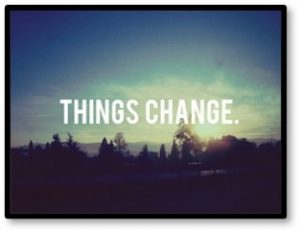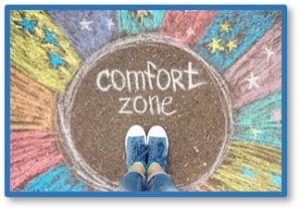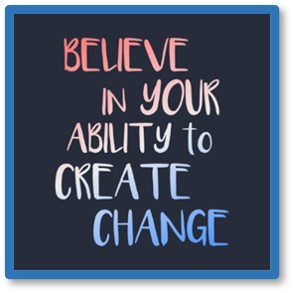Monday Author: Susanne Skinner
“Change is not a four-letter word, but often our reaction to it is.”
Jeffrey Gitomer, The Little Book of Leadership
 My friend Helen experienced an AHA moment during a recent visit to her hair stylist. While cutting her hair he said he was struggling with her curls. In Helen’s own words, “I don’t have curly hair! I have NEVER had curly hair! Where did those come from??” His response: “Things Change.”
My friend Helen experienced an AHA moment during a recent visit to her hair stylist. While cutting her hair he said he was struggling with her curls. In Helen’s own words, “I don’t have curly hair! I have NEVER had curly hair! Where did those come from??” His response: “Things Change.”
Simple words for an epiphany that everyone understands. Change is a reality, but it comes with a double edge. We celebrate it and we also struggle to accept it.
Things Change. It’s a universal truth in our lives and in our world.
Corporate Changes
In the business world, change is another word for long-term growth planning. Corporate changes happen all the time, impacting individuals as well as organizations, and many CEOs get it wrong.
Poor decisions trickle down, imposing unwelcome and unexpected change. Those on the receiving end have little to no say; only the choice of sucking it up or losing their job.
Forced change is never easy. We feel helpless when we are not in control of what happens to us. Despite their upfront sting, involuntary job changes sometimes reveal hidden benefits. Appreciation and acceptance come over time, bringing a positive perspective to change that initially feels negative.
Personal Changes
Most people fear personal change because it represents the unknown. When the odds are in our favor, we handle change like a boss. But when the opposite is true, we struggle to accept it. Our response is reactive instead of proactive because our minds block the emotional acceptance of something new or different. Holding on to the status quo is a safe and easy path.
Change freaks us out, especially when perceived as a threat. Our instinct is to meet it defensively by refusing to step out of our comfort zone. We resist, hoping it goes away if we ignore it.
But when change appears as a constructive challenge or new opportunity, we are emotionally open to expanding our thinking and improving our coping skills.
Leave Your Comfort Zone
Knowing we need to change and making changes are two different mind sets.
 Our brains keep us wired into our comfort zones; we’re happy doing what we’ve always done. We cling to familiar routines that allow us to predict and manage what happens next.
Our brains keep us wired into our comfort zones; we’re happy doing what we’ve always done. We cling to familiar routines that allow us to predict and manage what happens next.
Stepping outside of these comfortable places challenges our assumptions and opinions. What if we discover the things we’re doing aren’t necessarily things we should keep doing?
Growth depends on change, but sometimes change arrives unscripted and unwelcome, forcing us to accept something we did not plan. Tragedy and extreme hardship are two of the most debilitating changes we experience, reshaping our lives around missing pieces.
Accepting Change
People my age experience a fair number of Major Life Changes. For me, this includes the death of my parents, children growing up and leaving, downsizing and moving to our forever home, and last but not least—retirement.
These passages cannonball you out of your comfort zone with changes that are not always within your control. Sometimes you have to make it up as you go because there is no change playbook.
I’m open to personal change but at the same time I have to admit I like things the way things are! Small changes within my control suit me, because at this stage of my life I am fearful of big changes. As I get older, they get harder and I am less inclined to think of them as personal growth opportunities.
I meet changes head on, but deep inside of me lives the fear that I won’t be able to adapt when they happen. I wonder if I will step up and make the most of them or fall back and cling to the familiar.
Creating Change
Mahatma Gandhi says, “Our greatness lies not so much in being able to remake the world as being able to remake ourselves”.
We create change in ourselves when we open the door to curiosity. Exploring the unknown invites us to do things differently or not at all. It gives us the freedom to remake ourselves and affirm things already in place.
 I enjoy creating change in my personal space on a regular basis. In a small way it allows a measure of control in my life and it brings me joy. My husband recently changed the bathroom faucets and we’re undertaking an expansion of our outdoor living space.
I enjoy creating change in my personal space on a regular basis. In a small way it allows a measure of control in my life and it brings me joy. My husband recently changed the bathroom faucets and we’re undertaking an expansion of our outdoor living space.
Living in a small house allows me to create seasonal change by altering the décor and color schemes. A throw pillow with a pumpkin gets replaced by one with a holiday wreath. I like to move things around to create a sense of newness and a different visual path.
In the grand scheme of things, it is insignificant. These small acts form a controlled and safe space against the broader spectrum that exists beyond my control.
I’ve also reimagined the way I work. Nothing major, but I like the new sense of balance it gives me with respect to my free time. Sometimes making a small change will jumpstart bigger changes that are just waiting for the right moment.
A Different Mindset
Humans resist change because we focus on what we have to lose instead of what we have to gain. It’s a hurdle we all face and sometimes acceptance becomes the path of least resistance. Success or failure does not come from things that happen to us but in how we respond to them.
Change is inevitable. It’s an emotional experience that easily overwhelms us, making it difficult to move forward. Creating a mental bridge provides a way to walk away from resistance and move towards acceptance. A different mindset opens us to new perspectives. New perspectives give us the confidence to embrace new ideas.
In the Circle of Life, things change, and therefore so do we.
